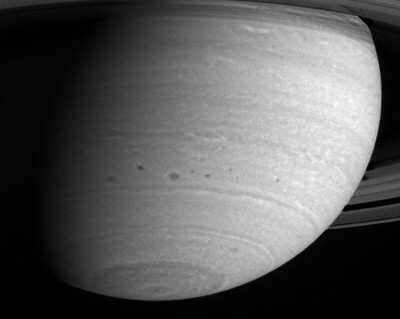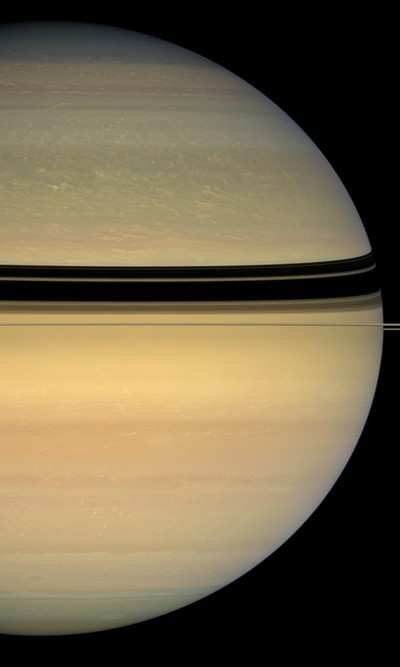Thu, Jun 04, 2009
The forecast for Titan's early autumn -- warm and wetter.
Cloud chasers studying Saturn's moon Titan say its clouds form
and move much like those on Earth, but in a much slower, more
lingering fashion.

Scientists with NASA's Cassini mission monitored Titan's atmosphere
for three-and-a-half years, between July 2004 and December 2007,
and observed more than 200 clouds. They found that the way these
clouds are distributed around Titan matches scientists' global
circulation models. The only exception is timing -- clouds are
still noticeable in the southern hemisphere while fall is
approaching.
"Titan's clouds don't move with the seasons exactly as we
expected," said Sebastien Rodriguez of the University of Paris
Diderot, in collaboration with Cassini visual and infrared mapping
spectrometer team members at the University of Nantes, France. "We
see lots of clouds during the summer in the southern hemisphere,
and this summer weather seems to last into the early fall. It looks
like Indian summer on Earth, even if the mechanisms are radically
different on Titan from those on Earth. Titan may then experience a
warmer and wetter early autumn than forecasted by the models."

On Earth, abnormally warm, dry weather periods in late autumn
occur when low-pressure systems are blocked in the winter
hemisphere. By contrast, scientists think the sluggishness of
temperature changes at the surface and low atmosphere on Titan may
be responsible for its unexpected warm and wet, hence cloudy, late
summer.
Seasons on Titan last more than seven Earth years. As Titans'
summer changes to fall at the equinox in August of this year,
Titan's clouds are expected to disappear altogether. But,
circulation models of Titan's weather and climate predict that
clouds at the southern latitudes don't wait for the equinox and
should have already faded out since 2005. However, Cassini was
still able to see clouds at these places late in 2007, and some of
them are particularly active at mid-latitudes and the equator.

Titan is the only moon in our solar system with a substantial
atmosphere, and its climate shares Earth-like characteristics.
Titan's dense, nitrogen-methane atmosphere responds much more
slowly than Earth's atmosphere, as it receives about 100 times less
sunlight because it is 10 times farther from the sun.
More News
Aero Linx: JAARS Nearly 1.5 billion people, using more than 5,500 languages, do not have a full Bible in their first language. Many of these people live in the most remote parts of>[...]
'Airplane Bounced Twice On The Grass Runway, Resulting In The Nose Wheel Separating From The Airplane...' Analysis: The pilot reported, “upon touchdown, the plane jumped back>[...]
"Burt is best known to the public for his historic designs of SpaceShipOne, Voyager, and GlobalFlyer, but for EAA members and aviation aficionados, his unique concepts began more t>[...]
"Polaris Dawn, the first of the program’s three human spaceflight missions, is targeted to launch to orbit no earlier than summer 2024. During the five-day mission, the crew >[...]
There Are SO Many Ways To Get YOUR Aero-News! It’s been a while since we have reminded everyone about all the ways we offer your daily dose of aviation news on-the-go...so he>[...]
 ANN's Daily Aero-Linx (05.04.24)
ANN's Daily Aero-Linx (05.04.24) NTSB Final Report: Quest Aircraft Co Inc Kodiak 100
NTSB Final Report: Quest Aircraft Co Inc Kodiak 100 Aero-News: Quote of the Day (05.04.24)
Aero-News: Quote of the Day (05.04.24) Aero-News: Quote of the Day (05.05.24)
Aero-News: Quote of the Day (05.05.24) Read/Watch/Listen... ANN Does It All
Read/Watch/Listen... ANN Does It All





